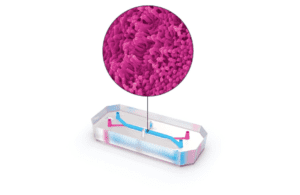
Colon chip from Emulate
Emulate has debuted what it terms a “colon intestine chip” targeted at pharma and biotech companies, academics and other researchers. The company believes the system will accelerate the identification of drug candidates to treat inflammatory damage in the colon.
The technology could be a boon for understanding inflammatory bowel disease, which approximately 1.6 million people in the U.S. About 70,000 cases of the disease are diagnosed annually, according to the Crohn’s & Colitis Foundation of America. Many of those cases don’t respond to therapy, according to Lorna Ewart, Emulate Bio executive vice president of science.
Emulate’s new intestine model combines human colonic organoids and supportive colonic endothelial cells to create an environment that simulates peristalsis.
In the following interview, Ewart describes potential applications of the new colon platform, touches on how the company’s technology is being used in COVID-19 research and shares her thoughts about organ-chip adoption in coming years.
Drug Discovery & Development: What is behind the name ‘colon intestine chip’?

Lorna Ewart
Ewart: The way we work at Emulate is to label our products primarily by the organ. The terminology ‘organ on a chip’ can sometimes be misleading because something like the intestine is made up of multiple regions. That’s why we call it a ‘colon intestine chip.’
We have a separate product called a ‘duodenum intestine chip.’ With our lung model, for instance, we have the alveolus lung chip. We are trying to model and the distinct parts of the organ.
the idea being that we have an epithelial endothelial interface. And when we get that working well, and then the product we’ve just launched today is where we then disrupt that barrier that’s formed by those T cells interfacing.
We can then start to build the complexity beyond that so this is the first of a few things we can go on and talk about that Emulate will be working on in this space, but primarily what we’re looking at is what’s known as leaky gut.
Our model has an epithelial-endothelial interface. We can break that barrier with inflammatory cytokines. We then see the increase in permeability, and then as a consequence, we can start to use anti-inflammatory drugs. We’ve used Tofacitinib, for instance, to show that you can start to reduce that response.
Ultimately, what we’re looking to do is work with people in pharma to find candidates that will restore the barrier. A large number of these patients never go into remission, so continually, we have this problem.
Drug Discovery & Development: What are some notable examples of recent research using Emulate’s other organ-chip technologies?
Ewart: One topical area, of course, is COVID-19. We have been very active with academic partners in various programs there. One of our academic collaborators is Leiden University in the Netherlands, which is working on using a chip to understand longer-term consequences of COVID-19 — so-called “long COVID syndrome,” which is thought in some individuals to result in fibrosis, which is an irreversible condition.
We also have collaboration with the École polytechnique fédérale de Lausanne (EPFL) in Switzerland. The researchers there are using it to understand how the virus gains entry into different cells. Because we have models for epithelial and endothelial cells, they can explore the kinetics of that infection profile.
Another collaboration is with the Queen Mary University of London. There, professor Daniel Pennington is looking at vascular injury associated with COVID-19 infection.
In North America, we have a cooperative research and development agreement (CRADA) with the FDA. They’re using our chips to look at the safety of COVID-19 vaccines.
A different division of the FDA, NIAID and Public Health England have connected and are using our chips to explore developing medical countermeasures against COVID-19.
Our equipment is being placed in high containment laboratories — BSL-3 and ultimately BSL-4. That means they can start to get used to using the technology with the SARS CoV2 virus.
Drug Discovery & Development: What do you see happening with the adoption of organ-chip technology in the next year or so?
Ewart: In full disclosure, I came from a pharmaceutical company. That is how I know the Emulate technology because I brought it into AstraZeneca in 2017 where I worked. We were beta testers for the platform.
The interest from the pharma companies a few years ago was: ‘What is all of this? Let’s just have a look at it.’ Scientists are quite skeptical and curious. It was brought in as an innovative technology rather than a tool.
I am seeing a gradual change of people saying: ‘OK, I played with it now, and I can see its possibilities now.’ They are beginning to want to do something with the technology — embed it in a program and start to use it for decision making.
In terms of adoption, I think we’re going to see a shift in that over the coming year. In pharma, of course, for the big juggernauts, it is quite difficult to change direction quickly. In the next couple of years, I think we’ll see an uptick in adoption.
We are working together with regulatory agencies as well. We want to try and have a paradigm shift. As you get a regulator to put out guidance saying, ‘This is what we want you to use,’ then it will be adopted.
Filed Under: clinical trials, Drug Discovery, Drug Discovery and Development, Infectious Disease, RD





Tell Us What You Think!
You must be logged in to post a comment.